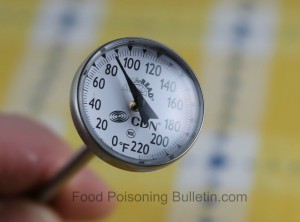Temperature fluctuations during commercial transport and retail storage and display can affect the quality and food safety of bagged salads, according to a new study published in the Journal of Food Protection. The study, the first to examine time and temperature in commercial settings, could improve the food safety of leafy greens which are a major source of food poisoning
 Researchers from Michigan State University in East Lansing, California Polytechnic State University in San Luis Obispo and the University of Cordoba in Spain, measured temperatures on five transportations routes covering four geographic regions. The measurements included two to three days in transport, one to three days in retail storage, and three days of retail display.
Researchers from Michigan State University in East Lansing, California Polytechnic State University in San Luis Obispo and the University of Cordoba in Spain, measured temperatures on five transportations routes covering four geographic regions. The measurements included two to three days in transport, one to three days in retail storage, and three days of retail display.
The conditions were then duplicated in a laboratory setting using retail bagged salads salad that had been contaminated with E. coli O157:H7 and Listeria monocytogenes. During the simulation, both the level of both pathogens increased during all three stages of measurement. But researchers found that the duration of retail storage has a significant impact on pathogen growth.
“This large-scale U.S. study—the first using commercial time/temperature profiles to assess the microbial risk of leafy greens—should be useful in filling some of the data gaps in current risk assessments for leafy greens, the study authors said in the abstract.




